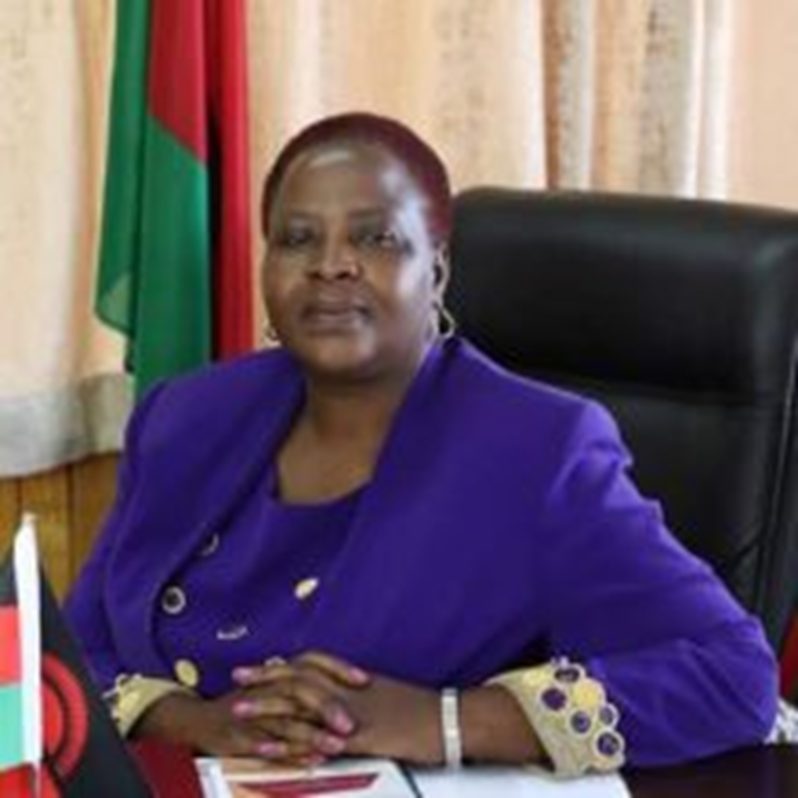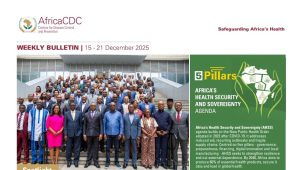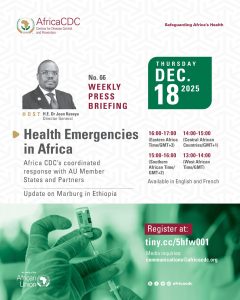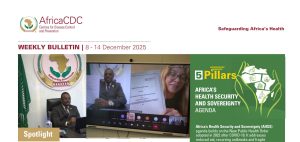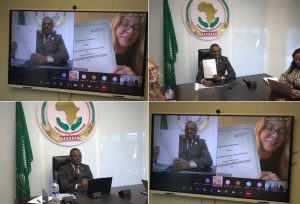- Please share with us Malawi’s experience in managing the recent 2022/2023 Cholera outbreak in addition to the Cyclone Freddy
The Government of Malawi quickly detected and declared the Outbreak in February 2022. However, the experience in managing the outbreak has been very challenging. Malawi experienced multiple Public Health Emergencies of International Concern before the Cholera Outbreak, including COVID-19, Polio, Tropical cyclones and floods. Responses to multiple emergencies overstretched the health system. - What response activities is Malawi employing in mitigating the impact of Cholera in the country?
- Considering the COVID-19 Presidential Taskforce that was already established, the President of Malawi authorized the integration of Cholera response into the Taskforce.
- In addition, through the excellent leadership of the President of Malawi, the End Cholera campaign (Tithetse kolera) was launched and re-energised the response with more resource allocation, more international and national partners and additional resource mobilization. Notable enough, the First Lady took part in the campaign, adding a strong community-centred dimension, bringing ownership of the response to the people in different communities.
- The (Cluster) multisectoral approach brought together all relevant sectors that worked seamlessly together with a common objective to contain the outbreak
- The establishment of the Incident management system (IMS) and having Technical working groups respond to the outbreak has been an approach working well to coordinate and provide guidance on operations from the National level to the least lower level
3. What has been the most challenging aspect of responding to the Cholera outbreak in Malawi? - The biggest challenge has been that the country was overwhelmed by multiple emergencies, including COVID-19, tropical storm Ana effects, polio, and the recent Tropical Cyclone Freddy.
- These multiple emergencies depleted the resources, destroyed the water, sanitation and communication infrastructures and overstretched the response efforts. In addition, the health workforce was highly fatigued from the intense response activities
- Furthermore, we noted fatigue in the population following multiple interventions e.g. polio vaccination, cholera vaccination, and COVID-19 vaccination.
4. How important is a multisectoral approach and cross-border collaboration in preventing and managing cholera outbreaks?
- The government of Malawi embraced a multisectoral approach to bring together the Taskforce with relevant Government institutions and other technical agencies, Africa CDC, WHO, UNICEF and Civil Societies to better coordinate the resources and response.
- This approach brought in better resource allocation, better coordination to the response
- The Government of Malawi is working with regional partners to strengthen cross-border collaboration to foster information sharing and joint response efforts.
5. How can other Member States improve early detection and response efforts for effective and timely containment of any disease outbreak?
Early detection
- Member States should invest in preparedness activities by building capacity in key areas of epidemic management, such as enhanced surveillance, laboratory capacities, reporting, and community engagement structures.
- Strengthening PHEOCs is another important aspect we encourage other MS to work on. Following the Lusaka Call to Action, it is important we have PHEOCs fully functional supporting the early detection and timely containment of outbreaks.
- Member States should know their priority diseases and develop appropriate capacities, in line with that they need to embrace Africa CDC continental framework for early warning and epidemic intelligence.
Response
- Member States should embrace the Lusaka call to action by establishing public health emergency operations centers to oversee all outbreak emergencies while employing a Multisectoral approach
6. In February 2023, the President of Malawi, His Excellency President Dr Lazarus McCarthy Chakwera, launched a campaign to end Cholera in Malawi, the Tithetse kolera (End Cholera) campaign. Please tell us about the progress and the impact of this campaign in the country. - This campaign was indeed a turning point for the containment of Cholera bringing the commitment of the president, religious leaders and other entities in spearheading the response.
- In addition, the involvement of the first lady Monica Chakwera provided an enabling environment for resource mobilization and other international agencies to implement the recommendations from the president.
- This campaign enabled the mobilization of additional resources from Africa CDC and other partners. Together, we were able to implement Community level initiatives, and high-level ministerial meetings, and numbers came down drastically.
- With the support from Africa CDC and other partners, the community workforce was capacitated with knowledge, and supplies and took charge. Health promotion services were tailored to the needs of the different communities. This community lead initiative created a sense of ownership of interventions and the results are a remarkable decline in cases.
7. Following the High-Level Emergency Ministerial meeting on Cholera Epidemics, Polio, and Climate-Related Public Health Emergencies held in Malawi in March 2023, What is your opinion on the importance of similar gatherings and High-level leadership for our public health? - The meeting brought together Ministers, RECs Representatives, and Technical Institution Leadership to come up with Frameworks and Commitments towards Public Health Initiatives in the region
- Such a meeting brought in the Framework of Crossborder collaborations amongst the countries which is key to public health interventions
- These meetings spearhead the political will of our Public Health key initiatives in our respective countries, and we look forward to similar support in future. It is important for our Technical Institutions such as Africa CDC to support follow-up and make sure we fulfil our obligations to come to fruition.
8. Africa CDC has supported various response efforts on both Cholera and COVID-19 vaccine coverage in Malawi. How would you describe this support from your experience?
- Africa CDC support was very effective because it was tailored to address the gaps as we identified them.
- Africa CDC supported the Cholera response efforts from the initial declaration of the outbreak in February 2022. The Institution supported through capacity building in Water Quality Monitoring, IPC, Case Management.
- They went on to conduct an Intra Action Review of the cholera outbreak in November 2022 to understand the response to the protracted outbreak and how to support the gaps identified.
- Through the Saving Lives and Livelihoods (SLL) Initiative, Africa CDC has been at the forefront to support the COVID-19 Vaccine Coverage in the country and notable improvements have been recorded towards the attainment of herd immunity in the country.
- Notable achievements of the Africa CDC SLL Initiative includes:
- Combined efforts to support awareness creation and mass mobilization for COVID-19, cholera vaccination and other health services in the country
- Strengthened COVID-19 vaccination outreach campaigns, Public address systems and transport logistics to vaccination teams in underserved communities
- Leveraging on SLL Messaging to intensify RCCE efforts including other health services
- 9. Considering WHO’s announcement on lifting COVID-19 as a public health emergency, what is the Government of Malawi’s response to this declaration, particularly on the continuous COVID-19 vaccine coverage?
- Yes, Malawi is in line with the recommendations from WHO. We have lifted some of the restrictions but also Malawi has started integrating covid-19 activities into primary health services with support from Africa CDC SLL program
- For instance, the provision of COVID-19 and cholera vaccines, screening for NCDs and health talks at the COVID-19 Vaccine Centres
- In addition, our Community Health Volunteers combined efforts for integrated campaigns and outreaches for COVID-19 and other essential health services
- Although COVID-19 is no longer considered a PHEIC, prevention of the re-emergence of COVID-19 is still our priority. Therefore, we are committed to ensuring that herd immunity is achieved.
- We will continue providing safe and quality vaccines to the population alongside health promotion messages and also integrate COVID-19 vaccination into routine health services.
10. As a new public health agency for the continent, how can Africa CDC best position itself to ensure sustainability and maximum impact in Africa’s public health arena?
- Africa CDC is our first Continent-wide public health institution, and as such we want to see more Regional Collaborative efforts towards the AU MS
- Furthermore, now that it is an Autonomous Institution, it needs to bring all partners and stakeholders together and be the voice in terms of the challenges the continent experiences
- The Africa CDC through the Southern Africa Regional Coordinating Centre, has created an enabling environment with Technical Working Groups in the Region for networking, information sharing and bringing the National Public Health Institutes on one platform
- Africa CDC should fast-track the commitments in the New Public Health Order, Including strengthening public health institutions, workforce development especially at the community level, and local manufacturing of essential commodities such as vaccines
11. In short: Describe the future of public health in Africa.
- The COVID-19 pandemic gave us a learning experience to redesign our health system tailored towards our needs
- Through Africa CDC New Public Health Order, we build strong health institutions.
- We will coordinate health emergencies in our respective countries.
- We will have a workforce well trained and motivated with all the required tools
- We have an opportunity to produce our own commodities to match the growing demand in the continent

